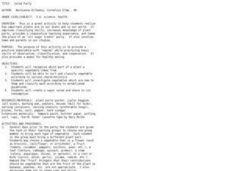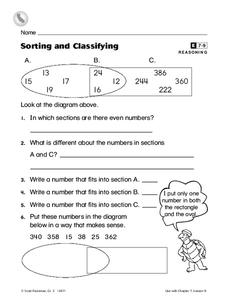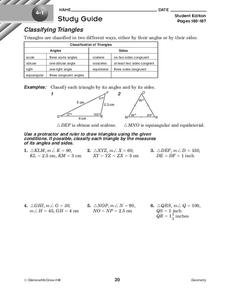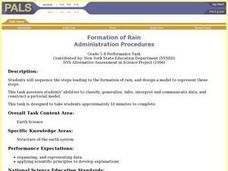Curated OER
Vegetable Party
Students classify vegetables and eat them as a salad. In this multi-disciplinary science and health instructional activity, students bring various vegetables to school and classify them in several different ways. Then with parent...
Curated OER
There Was An Old Lady...
First graders read "There Was An Old Lady Who Swallowed a Fly" and use Kid Pix to identify characters from the story. In this character identification activity, 1st graders first hear several versions of the classic tale, and then locate...
Curated OER
Lesson 1: Hot, Not, or Silly
Students discover burn prevention and fire safety while sorting and classifying related pictures. In this early childhood lesson plan, students identify ways to prevent burns, and discuss various ways in which burns may occur. Students...
Curated OER
The Grouchy Ladybug
Students learn about sorting and classifying objects by size while reading Eric Carle's "The Grouchy Ladybug". In this sorting and classifying lesson, students first listen to and interact with the story. They then look at cut-outs of...
Curated OER
Tool Shop
Students learn how tools help us accomplish things. In this tool discovery lesson, students review the function of tools. They then make a class chart and categorize different types of tools found in the classroom. Finally, they create a...
Curated OER
Sorting and Classifying
In this sorting and classifying worksheet, students analyze the numbers in a Venn diagram of 3 sections. Students answer 6 questions about the characteristics each section has in common.
Curated OER
Classifying Triangles
In this classifying triangles worksheet, 10th graders solve 12 different problems that include classifying various types of triangles. They classify and then identify each of the given triangles as isosceles, scalene, or equilateral....
Curated OER
Line Symmetry
In this line symmetry worksheet, 10th graders solve and complete 10 different problems that include various types of figures. First, they classify each figure illustrated as horizontal, vertical, both, or neither line of symmetry. Then,...
Curated OER
Classifying and Measuring Angles
In this classifying and measuring angles instructional activity, 10th graders solve and complete the measures of various types of angles. They determine whether each angle drawn is a straight, right, obtuse, acute, or reflex angle. Then,...
Curated OER
Classifying Triangles
In this classifying triangles worksheet, 10th graders solve 9 various problems that classify triangles into categories. First, they refer to the figure shown of an isosceles triangle with two line parallel. Then, students name the sides,...
Curated OER
Classifying Triangles
In this classifying triangles instructional activity, 10th graders solve 6 different problems related to the classification of triangles either by their angles or by their sides. First, they use a protractor and a ruler to draw triangles...
Starfall
Short E - Classification (Animal, Thing)
In this language arts worksheet, students practice classifying the nouns into the right category. They also use the pictures as clues to meaning.
Starfall
Short A - Classification (Person, Place, Thing)
In this literacy worksheet, learners practice classifying nouns into the correct category as an animal, person, or thing. They pick the words from the word bank.
Curated OER
Body Movements
In this body movements cut and past worksheet, students examine 6 pictures depicting parts of the body. Students cut and paste 6 corresponding words from the word bank and paste them under the correct body part.
Curated OER
Around the House Cut And Paste
In this household sorting worksheet, students study a house shaped picture with 5 rooms labeled. They cut and paste objects from the word bank and sort them into the proper room.
Curated OER
Bivalve or Univalve (Clam or Snail)?
Fourth graders explore the meaning of the prefixes "bi" and "uni." In groups, 4th graders observe pictures of shells and handle real shells. Students create a chart to classify each shell as a bivalve or univalve. They identify the...
Curated OER
Living vs. Non-Living Things
Fourth graders describe the characteristics that determine if something is living, dead, or non-living. They determine the difference between living and non-living things. Students determine if an object is living or non-living and...
Curated OER
Suspended Particulates lab
Learners observe differences between suspended particulates and a solution, and classify common atmospheric gases and particulates. They explain what they think the word suspended means. Students observe the differences between what...
Curated OER
Where Do Animals Live?
Students c;assify where pets live and where wild animals live and comprehend the differences. They investigate what kinds of homes pets and wild animals need. Students bring in a stuffed animal or puppet from home and match their...
Curated OER
Classification of Animals
First graders investigate the characteristics of vertebrates. They classify each as mammal, fish, bird, and reptiles. Students explore the differences between various types of animals and classify each.
Curated OER
Introduction To the Classification of Organisms
Students discuss how scientists classify organisms. In pairs, they analyze and label "specimens" of breakfast cereals in order to classify them into the correct group. They create a dichotomous key for several species of animals.
Curated OER
Formation of Rain
Students sequence the steps leading to the formation of rain, and design a model to represent these steps. This task assesses students' abilities to classify, generalize, infer, interpret and communicate data, and construct a pictorial...
Curated OER
Formation of Wind
Learners correctly sequence the steps leading to the formation of wind, and describe the cause and effect relationships involved in the formation of wind. This task assesses students' abilities to classify, generalize, infer, interpret...
Curated OER
Critter Museum
Young scholars act as directors of a new science museum where they have decided to set up a display of animals without backbones that are found in the area. To organize their display, they need to sort and classify a collection of...

























